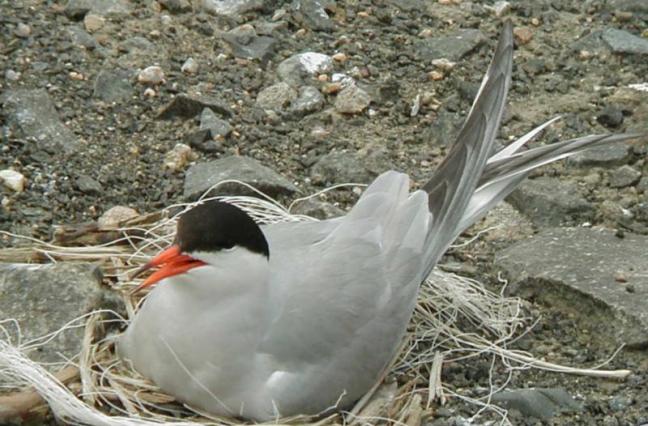This year, 2018, marks the 100-year anniversary of the signing of our own Migratory Bird Treaty Act. It’s because of this treaty that many bird species—including some for which Maine is well known—are still with us. In fact, without the MBTA, species such as the Common Eider and Wood Duck likely would have disappeared from the earth forever.
In honor of this anniversary, a large coalition of groups including the National Geographic Society, Birdlife International, the National Audubon Society, the Cornell Lab of Ornithology, and many others have declared 2018 to be the Year of the Bird. The road leading to this important moment in history, though, was not an easy one, and it extends beyond birds.

Common Terns were the victims of unregulated hunting and egging activities and might have disappeared from the Maine coast without the protections of the Migratory Bird Treaty Act. (Photos courtesy of Jeff Wells)
The years 1914 to 1918 are an abstraction for most of us. But those years played a pivotal role in the history of people, families, towns, businesses, and governments across much of the world. A small regional conflict and a series of political miscalculations drew in the strongest and most powerful armies of Europe to become a war of unimaginable horror that eventually left as many as 16 million people dead and many more physically and emotionally wounded.
The U.S. was drawn into the war in 1917, and Maine itself sent 32,000 of its citizens (including 300 nurses) to serve. One thousand of them died in the muck and cold of faraway battlefields across the Atlantic before the war ended in the waning months of 1918. Other Mainers became enlisted in the war effort to build ships and munitions to help. In the midst of this upheaval, Maine and other New England states endured a massive influenza outbreak in the winter of 1917-1918 that in Maine alone left 5,000 dead.
What, you may ask, does this have to do with birds?
It seems a strange coincidence, given all of the horrible things happening at the time, but one of the world’s first and most important bird conservation treaties and enacting laws was negotiated and signed during these same years. The Convention for the Protection of Migratory Bird—commonly called the Migratory Bird Treaty—between the U.S. and Canada (technically, Great Britain had to act on behalf of Canada at that time), was signed in 1916. Canada went on to pass its own legislation to enable and enforce the provisions of the treaty in 1917 with what is known as the Migratory Birds Convention Act. In the U.S., our version, the Migratory Bird Treaty Act, was passed in 1918.
The treaty and the legislation were profound, world-changing events. The Migratory Bird Treaty showed the world that in contrast to the conflict, sadness, horror, and ugliness of World War I, it was possible for humanity to come together to do something good for the stewardship of its natural heritage and ultimately its people.
Perhaps that’s why such an important and groundbreaking conservation treaty and legislation passed in the midst of global human sorrow and suffering. Perhaps people felt, more than ever, that they had to show the positive side of humanity.
In an unfortunate irony, as birders, conservationists, and others who care about the natural world celebrate the year of the Bird, the Department of the Interior has just released a directive to effectively gut much of the protections of the Migratory Bird Treaty Act for birds. NRCM’s federal project staff are diligently tracking efforts like these and will let you know when and how you can take action.
Perhaps in this Year of the Bird when there is so much strife and conflict in the world, people will again show its better side for the benefit not only of birds, but for all, and as a model for all human interactions across the globe.
The year 2018 marked the 100-year anniversary of the signing of the Migratory Bird Treaty Act (MBTA). It’s because of this treaty that many bird species—including some for which Maine is well known—are still with us rather than disappearing from the earth forever. In honor of this anniversary, the Natural Resources Council of Maine, along with a large coalition of other groups including the National Geographic Society, Birdlife International, the National Audubon Society, the Cornell Lab of Ornithology, and others declared 2018 to be the Year of the Bird. In celebration of this conservation success story, and to put the spotlight on the importance of initiatives such as these, birders Jeff and Allison Wells posted each month in 2018, the “Year of the Bird.”











Leave a Reply